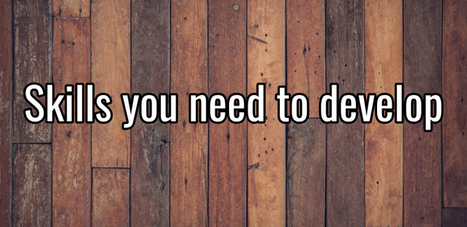Change is always awkward at first, but it gets easier with practice.
Get Started for FREE
Sign up with Facebook Sign up with X
I don't have a Facebook or a X account

 Your new post is loading... Your new post is loading...
 Your new post is loading... Your new post is loading...

The Learning Factor's curator insight,
March 28, 2017 6:17 PM
Mental toughness is a muscle, and like all other muscles, it demands consistent exercise to get stronger.

The Learning Factor's curator insight,
March 19, 2017 7:23 PM
Humans have an average eight-second attention span. You’re going to need to do better if you want to get things done.

The Learning Factor's curator insight,
February 19, 2017 6:05 PM
It's low-key but critical. Whether they're working from inside an organization (in direct management or as a mentor) or from outside (as an executive coach), good coaches share one basic quality. 
Bryan Worn's curator insight,
February 20, 2017 3:13 PM
This quality is not just for coaches. It is fundamental for any effective or meaningful relationship.

The Learning Factor's curator insight,
January 24, 2017 4:29 PM
Classic to-do lists don't provide context or give a timeline, and they're easy to ignore. Here's how to make a better list. 
Jerry Busone's curator insight,
February 3, 2017 8:15 AM
I think Covey coined it focus on your Big Rocks

The Learning Factor's curator insight,
January 15, 2017 5:27 PM
The secrets behind four-minute meetings and scrapping your to-do list.

The Learning Factor's curator insight,
December 18, 2016 4:44 PM
These common habits are a lot more damaging than you might believe.

rodrick rajive lal's curator insight,
November 30, 2016 4:20 AM
Stress, surprisingly is a precursor for success! Some of the best art forms were produced in times of stress. The poet P.B. Shelley wrote 'Ode to the Westwind' when he was undergoing a lot of difficulties in life. The poem was to become one of the best works of poetry. It is for this reason that we need to understand that stress can be turned around and made into a tool for promoting success!
Adele Taylor's curator insight,
November 30, 2016 3:34 PM
Interesting... I always thought the whole 'I work well under pressure' was a bit of a cliché but it turns out to be true

The Learning Factor's curator insight,
November 22, 2016 11:13 PM
They approach life with a different mindset. |
Erin Jones's curator insight,
April 10, 2017 11:47 AM
At the end of every conversation, meeting, day, week...

Marshall Alston's curator insight,
March 27, 2017 1:38 PM
Here are 10 skills that you should learn that will last a lifetime.

The Learning Factor's curator insight,
January 24, 2017 4:35 PM
Bring your career to the next level by connecting with the right people

The Learning Factor's curator insight,
January 19, 2017 4:48 PM
Add these 7 routines to your night to set yourself up for success. 
rodrick rajive lal's curator insight,
January 20, 2017 12:10 AM
It is very important to let go of issues and pending matters carried over from work. Spending time catching up with the family, watching a film, reading books of a light nature before going off to sleep will help people de-stress from the day's hectic schedule. The article curated suggests a few things that people can do before going off to sleep. 
Bryan Worn's curator insight,
January 22, 2017 5:42 AM
Sleep - your body and your mind need it - then the others work

The Learning Factor's curator insight,
January 8, 2017 4:41 PM
Neuroscience offers some handy hacks to learn faster, focus better, and make smarter decisions this year.

The Learning Factor's curator insight,
November 27, 2016 4:29 PM
Learning is no longer something we just do in schools. 
Gisele HELOU's curator insight,
November 28, 2016 3:23 AM
Learning is no longer something we just do in schools. |
































